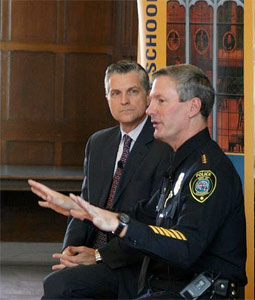O’Hear to Chair the Federal Nominating Commission
Since 1979, Wisconsin’s senators have used some form of what they term a “Federal Nominating Commission” to recommend individuals for vacant federal judgeships and U.S. Attorney’s positions. (One can see the current charter from the senators here.) Whether this approach is good public policy is a worthy question, but not my topic here.
Rather, I wish to make an observation concerning leadership of the Federal Nominating Commission: Where there is a vacancy, the charter calls for the dean of the law school in the federal judicial district (Marquette in the Eastern District and the UW-Madison in the Western District) or his designee to chair the commission. I have thus chaired the commission on occasions in the past.
With respect to the current vacancy in the U.S. Attorney’s position in the Eastern District, occasioned by the departure of Steve Biskupic, L’87, for private practice, I this week exercised my option to delegate my responsibilities. This occurs from time to time (e.g., the late Dean Howard B. Eisenberg tapped our colleague, Professor Peter K. Rofes, on one occasion in the 1990s, and a similar thing has occurred on occasion in the Western District).
Specifically, I have turned to my colleague, Michael M. O’Hear, Professor of Law, Associate Dean for Research, and (least relevantly) managing editor of this blog. My principal reason, besides other demands on my attention, is my belief that Professor O’Hear — a leading legal academic in the area of criminal sentencing — is unusually well qualified to help guide this search.
I hope that Professor O’Hear will consider using this blog as one of the means of disseminating information about the Federal Nominating Commission’s important undertakings. In all events, the commission’s recommendation of four to six individuals to serve as the U.S. Attorney in Milwaukee is due to the senators under the charter near the end of March.

